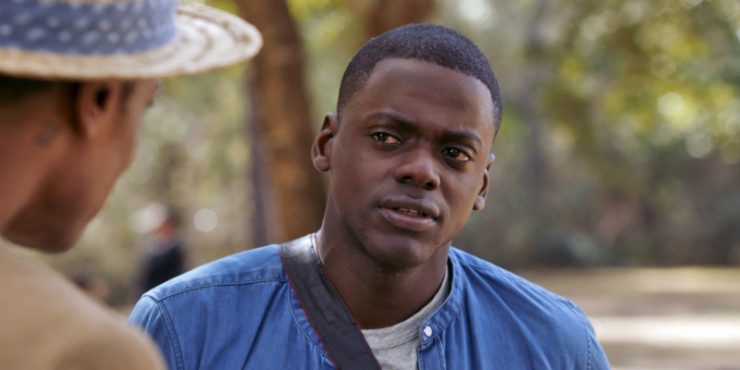The opening sequence in Jordan Peele’s directorial debut is a powerful, single shot. A young man (played by Lakeith Stanfield) walks the dark, quiet streets of a seemingly calm suburb. Before long he’s being followed by a car, and not long after that, he is abducted. This first scene is important. Its function is to show, right off the bat, that the eeriness residing within this film is not the product of the main character’s paranoia. It means to show you that there is real danger that the main character faces. It’s an interesting choice. It kills the suspense of the following scenario which, in a horror film, can be costly. It also sets the tone for the rest of Get Out, which doesn’t really function too well as a horror film or as a social satire, but instead is all metaphor. A metaphor that speaks to the bloody truth of racial divide in America unlike any thriller I’ve ever seen.
The movie follows Chris Washington (Daniel Kaluuya), a 26-year-old photographer who is dating Rose Armitage (Allison Williams), and is packing for a trip upstate to visit her parents for the first time. Chris is nervous, mostly because Rose admits that she hasn’t told her parents that he’s black, but she’s reassuring – her parents are welcoming liberals without racial prejudices. The couple has to drive through miles of toneless highway before arriving at the grand estate in the middle of the woods. Chris meets Rose’s father Dean Armitage (Bradley Whitford) and Rose’s mother Missy Armitage (Catherine Keener). Dean is a neurosurgeon and Missy is a psychotherapist, and both greet Chris warmly and with obvious effort toward putting him at ease in regards to his racial background. But Chris is immediately wary, especially when he meets the groundskeeper, Walter (Marcus Henderson) and the housekeeper Georgina (Betty Gabriel). If they’re so liberal why are the only black people in their home hired help?
We know from that opening sequence that things will take a turn for the worse, but the way in which Rose’s family reveals their diabolical nature is inspired and speaks to the way Peele attacks race in his work. What works best in Get Out is the stuff you aren’t even really allowed to talk about unless you’ve seen the film – spoilers, as it were – but as a narrative the film struggles to really get off the ground in either direction. Peele directs the film with great energy, balancing tone well and using classical style to raise tension in scenes that would otherwise not possess that off balance energy. And there lies the problem: this is a horror film that really isn’t ver scary, and a satire that isn’t very funny. Even the movie’s surprises unfold in a predictable way and while the screenplay certainly checks off all of the Robert McKee checkpoints, it doesn’t build upon its exceptional ideas with strong characters. The whole film is its racial metaphor which is strong on its own but I found myself wanting because its hard to feel like I really knew anything about Chris other than he was black.
Daniel Kaluuya is really trying here, and he delivers some good work. Chris is mostly only allowed to react, and the variety of faces that Kaluuya unleashes as he’s met with multiple indignities and awkward encounters is one of the film’s strong points. Chris is equipped with a best friend, Rod (Lil Rel Howery), who is the first to warn Chris about visiting Rose’s parents. As Chris is further sucked into the dark world he’s been placed in, Rod tries to use his job as an airport TSA agent to help save his friend from peril. Rod’s character is a classic stock character, part helpful friend and comic relief, but Howery’s performance is a welcome reprieve from the rest of Get Out‘s horror film place-setting. It’s difficult not to watch Get Out and not be more interested in Rod’s bumbling detective work verses Chris impending victimhood.
As the predatory family, Whitford, Keener and Williams seem to savor their chance to savage white liberalism, something that has too long been so sacrosanct as to deserve reproach. The Armitages are a family we all know well: they love the Obamas, Oprah, Blackish but struggle thoroughly when trying to truly understand the black experience. It would probably be better for all if they stopped trying. Peele’s needling at this hypocritical part of white America is great fun. He’s ruthless in his portrayal, but his script is smart enough to understand the dynamics of what racism is. There’s the hateful racism of so many films from To Kill a Mockingbird to Hidden Figures, but Get Out shows the racism of fetishization, the consumption of culture and the nastiest parts of envy. I’m glad to see that Get Out is a hit, and its provocative nature proves to me that Jordan Peele will have many more interesting film projects in the future. I just wish it functioned better as an actual movie and as a story. A great idea is very little without a structure behind it, but that doesn’t mean the idea isn’t still great.
Written and Directed by Jordan Peele










